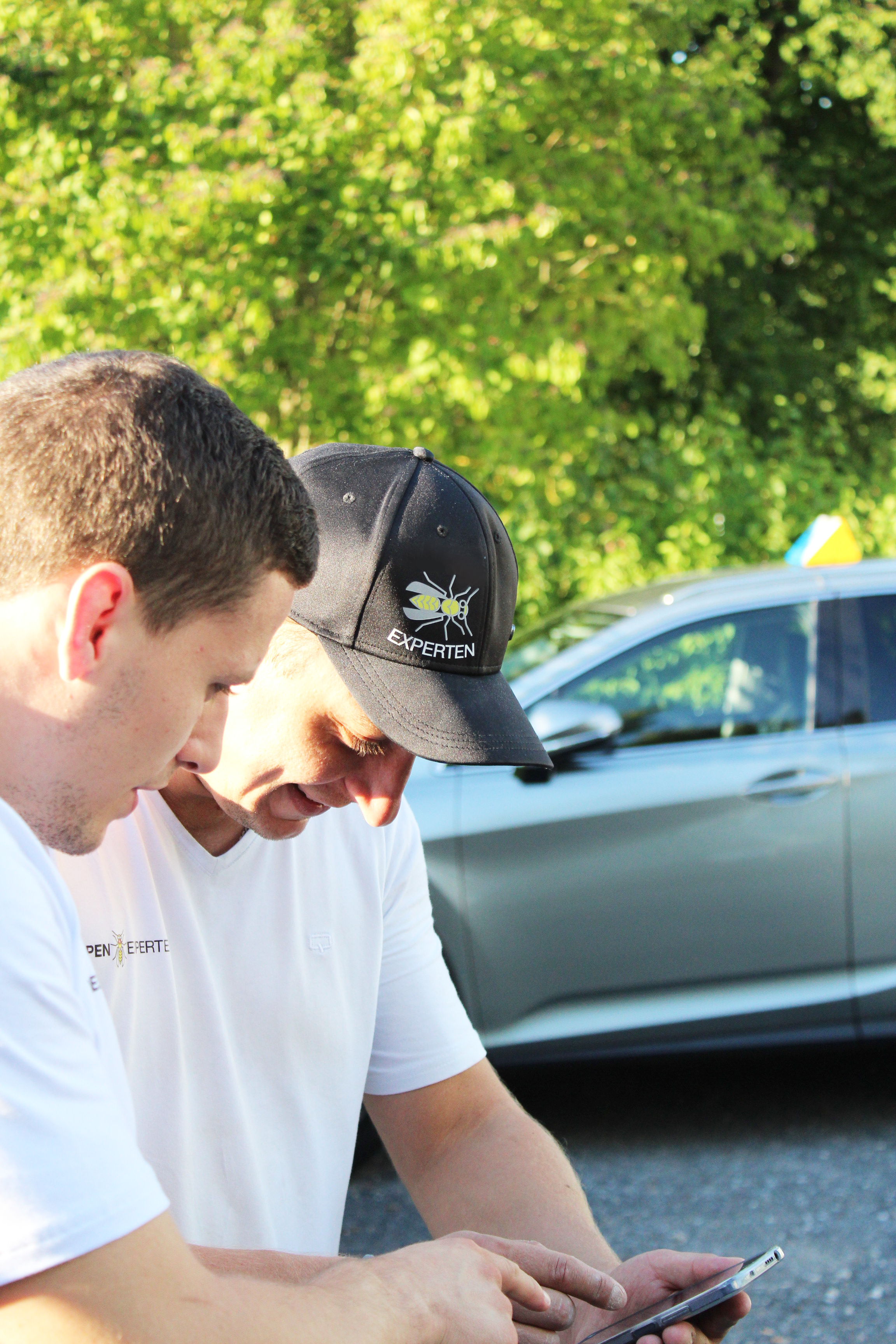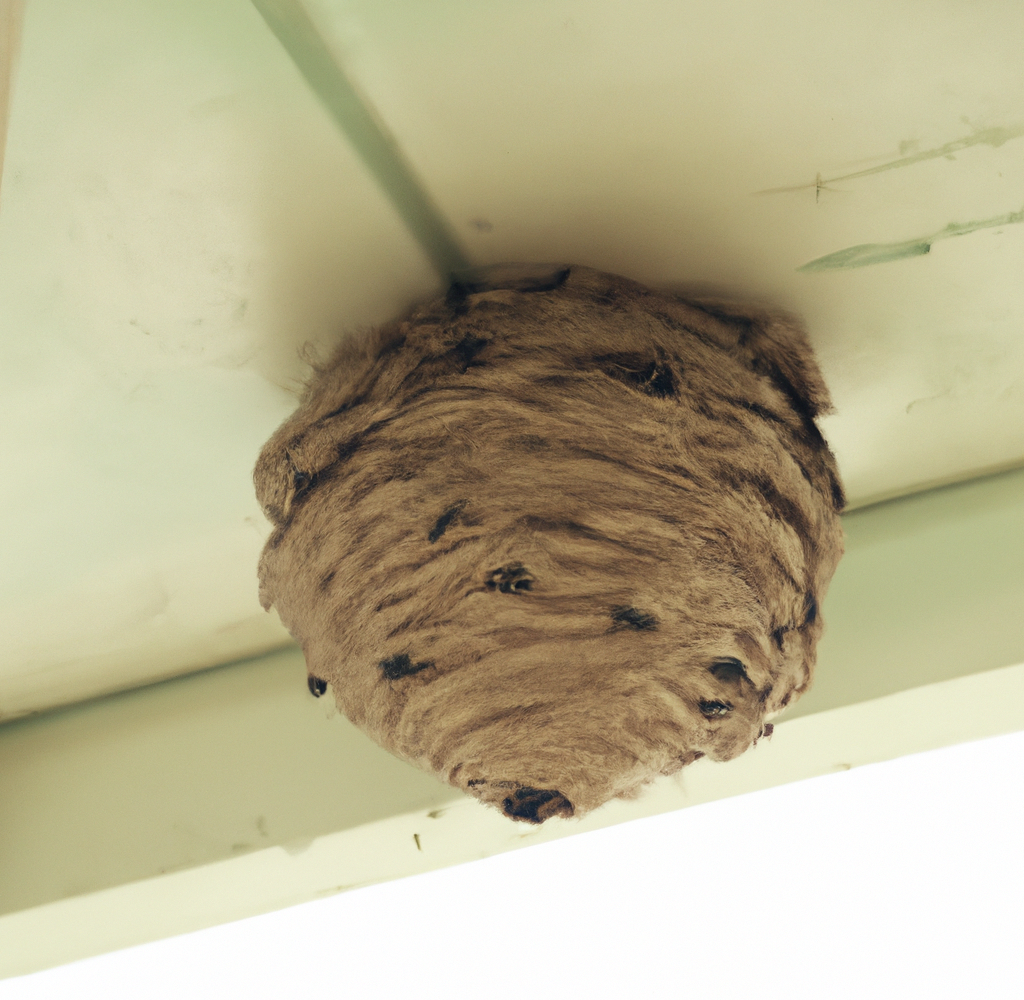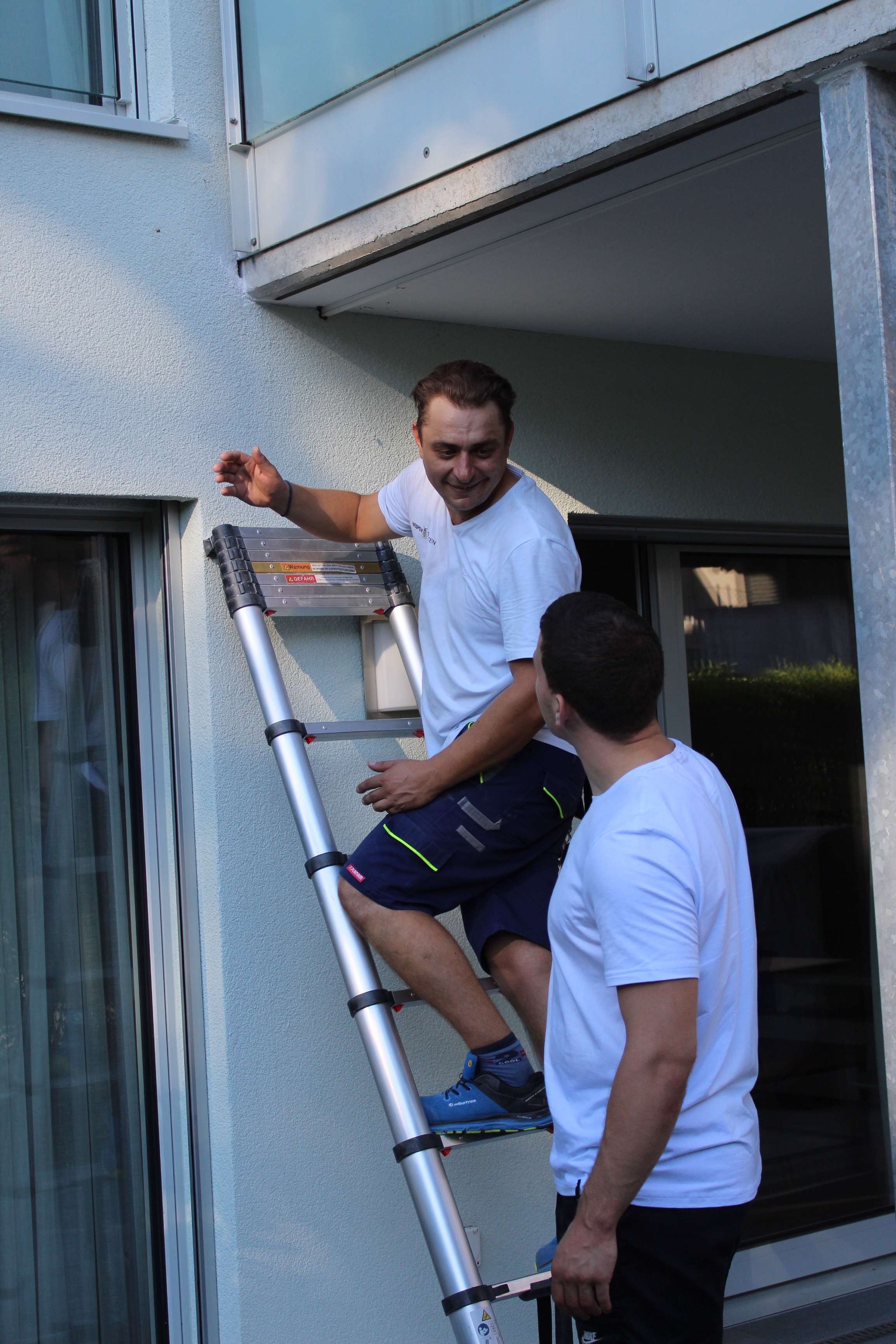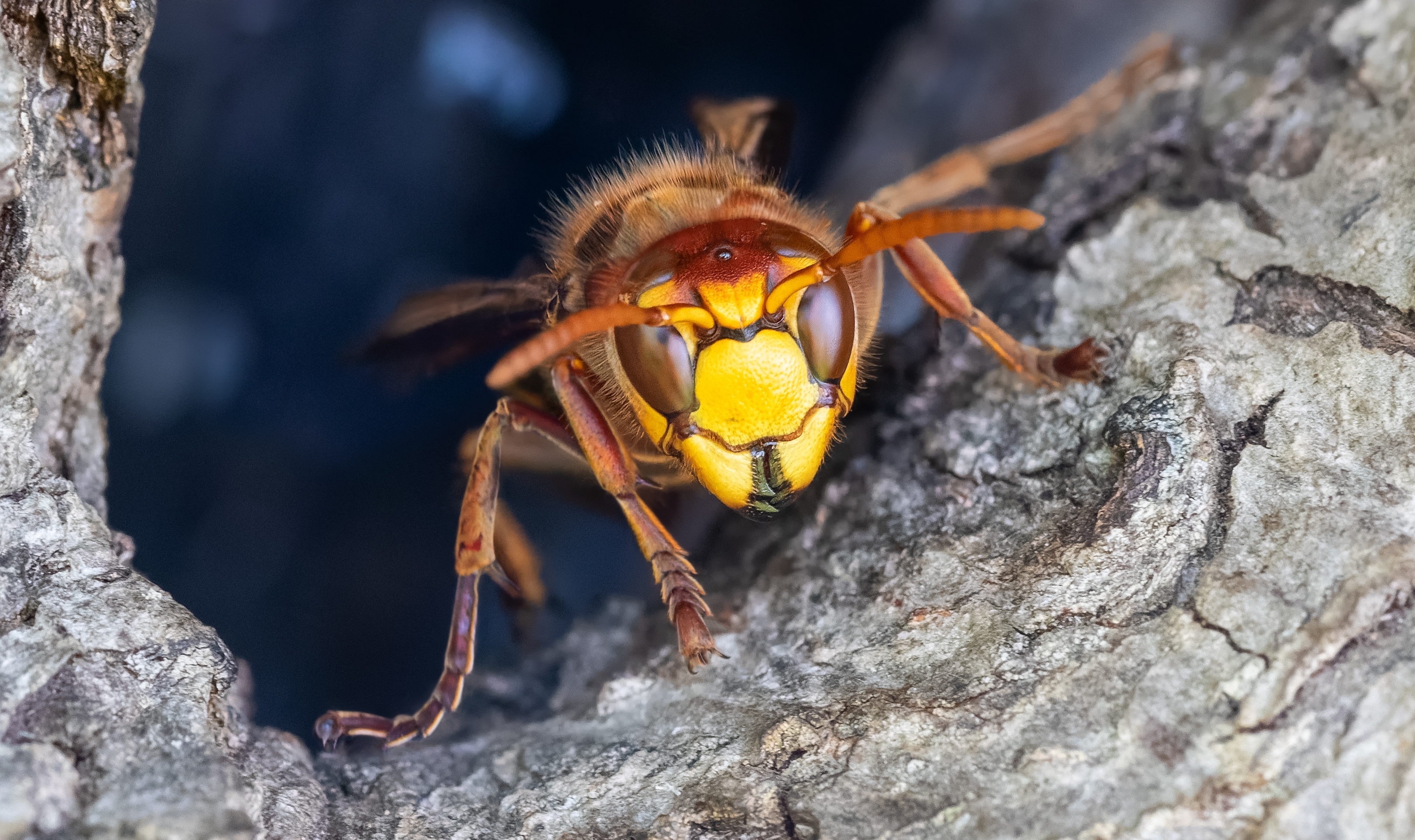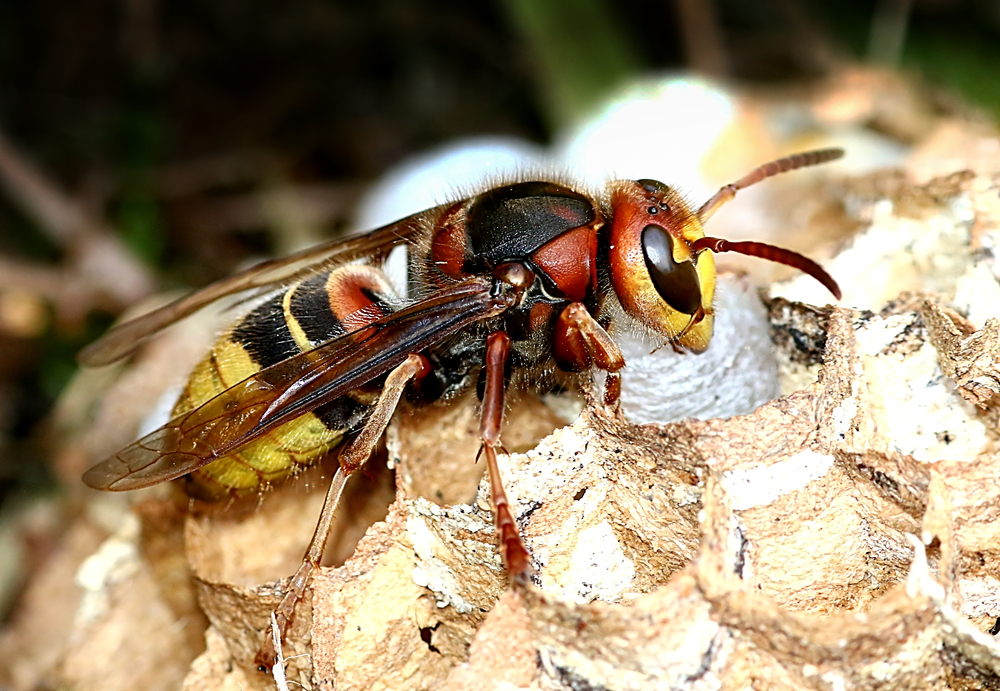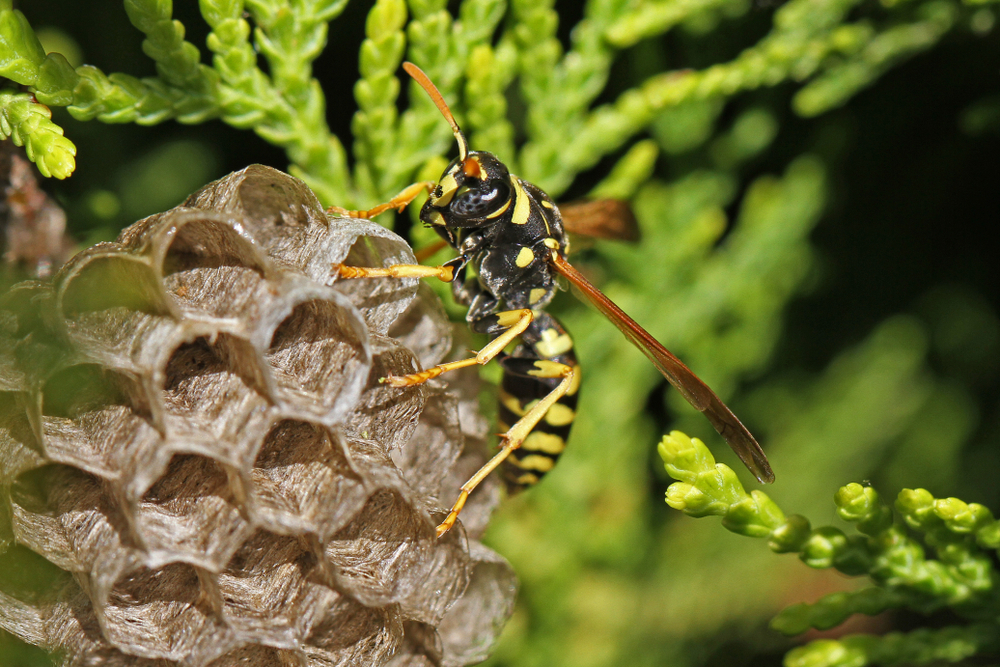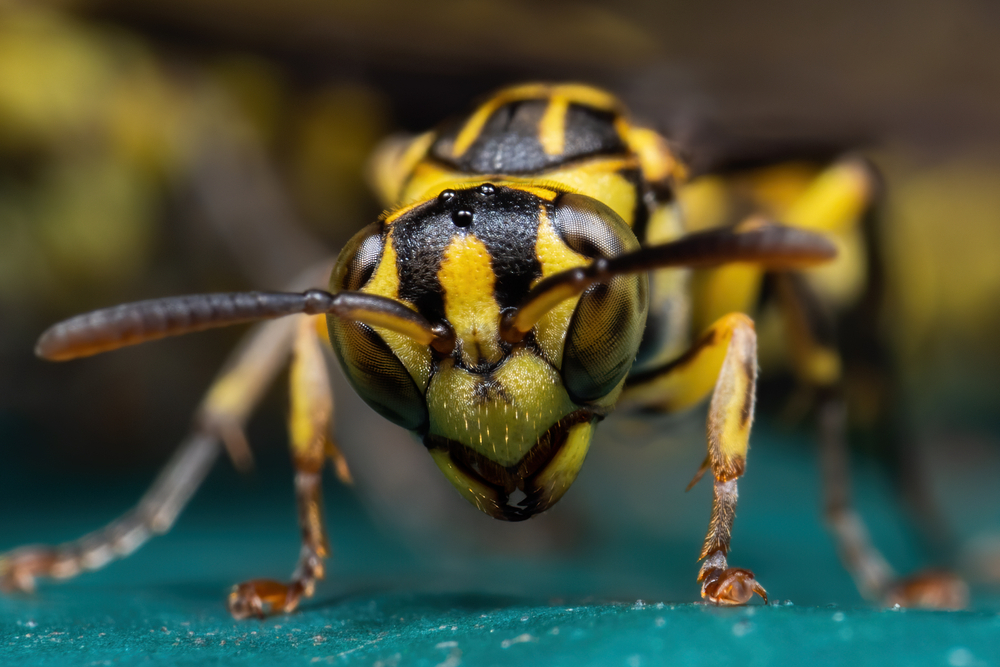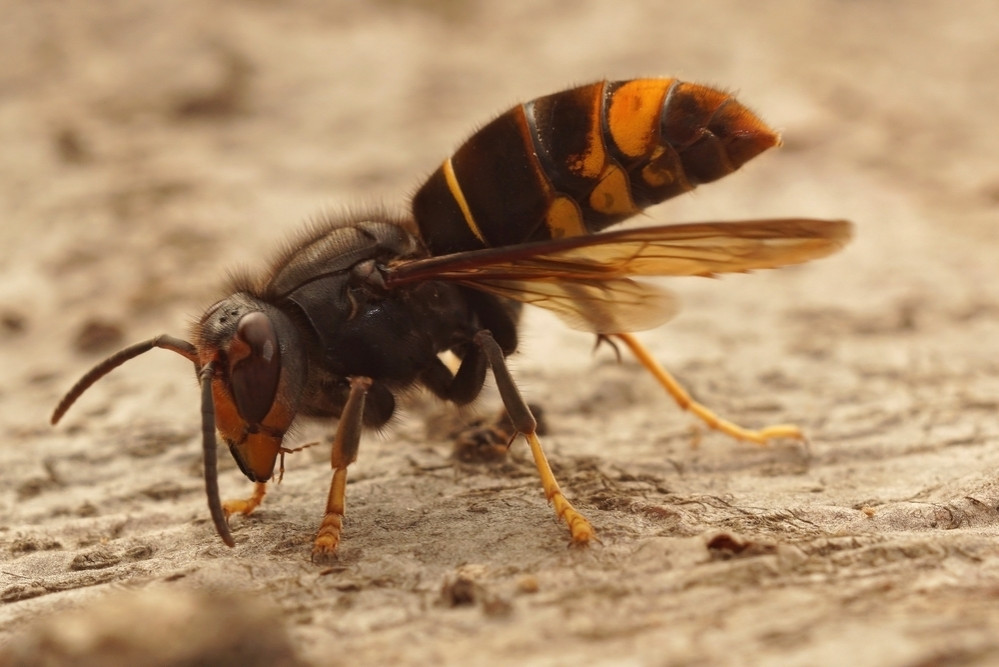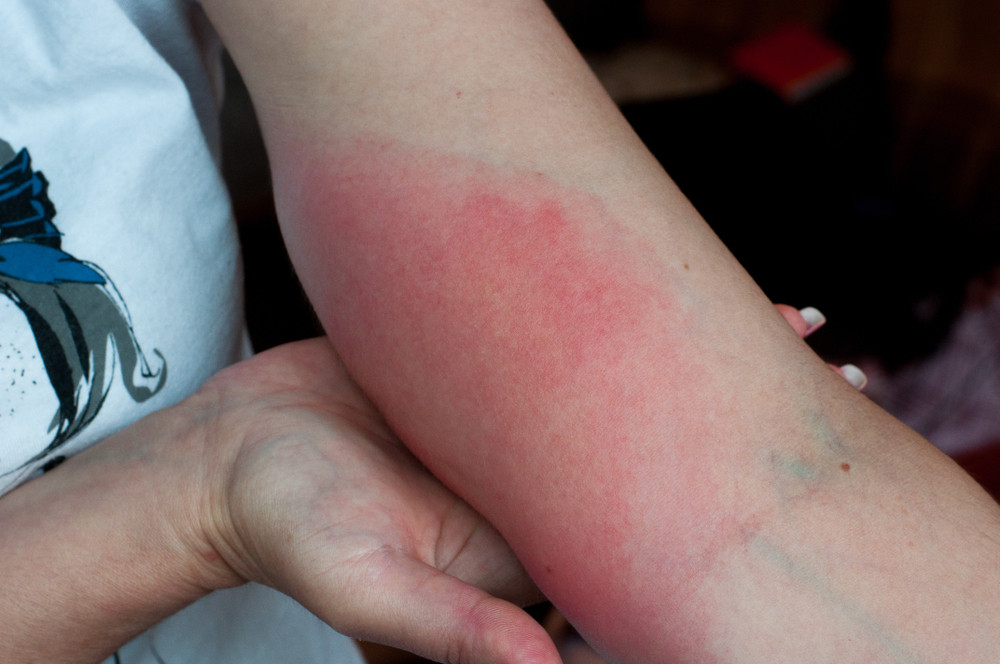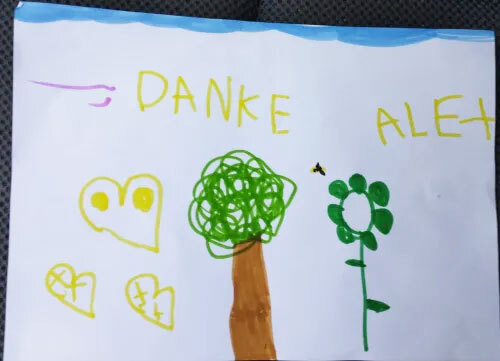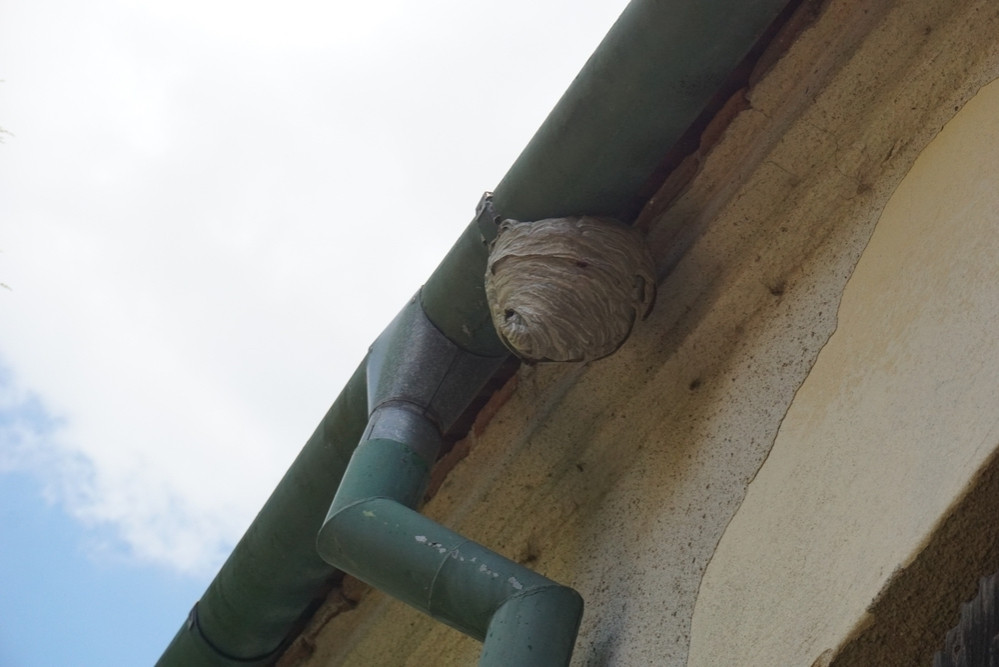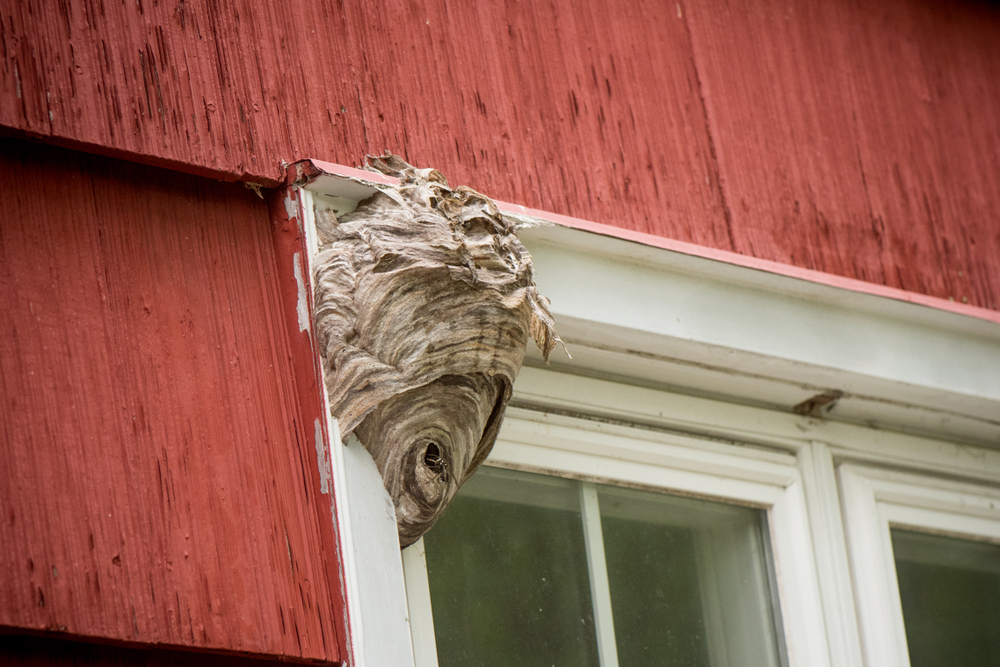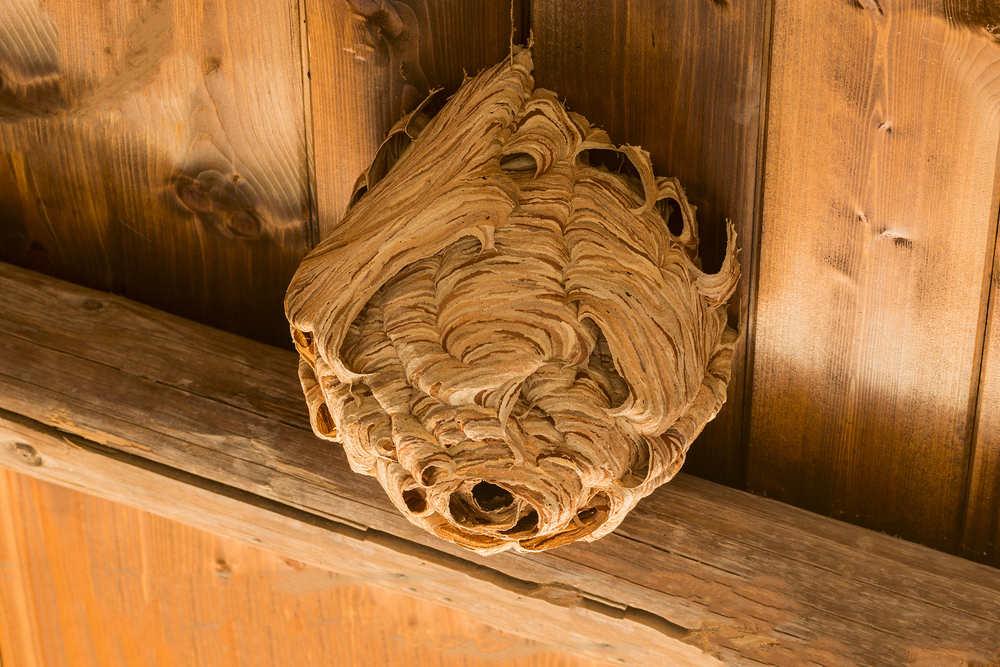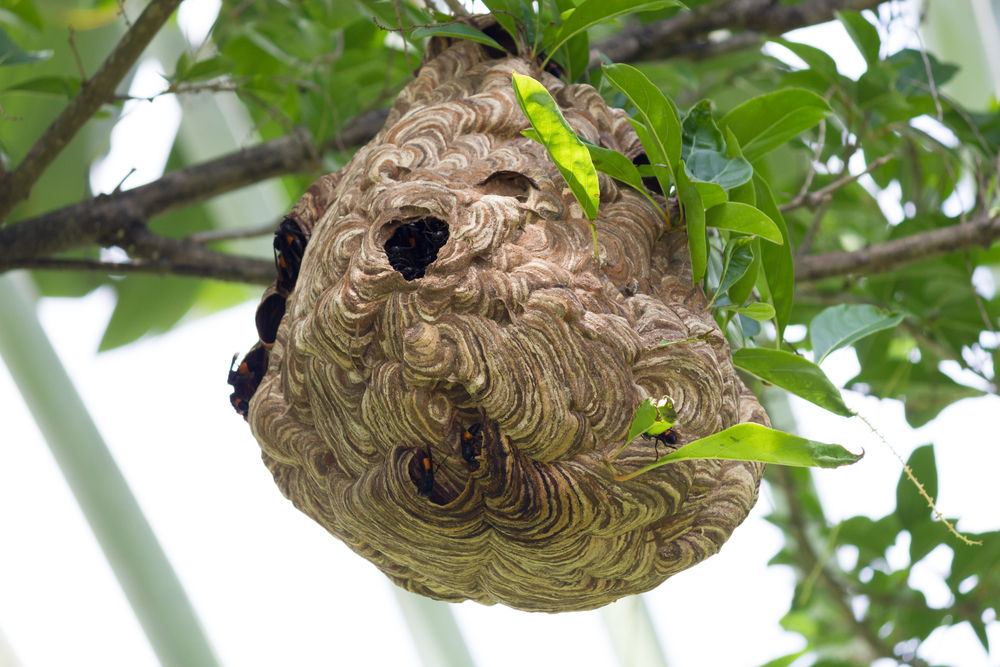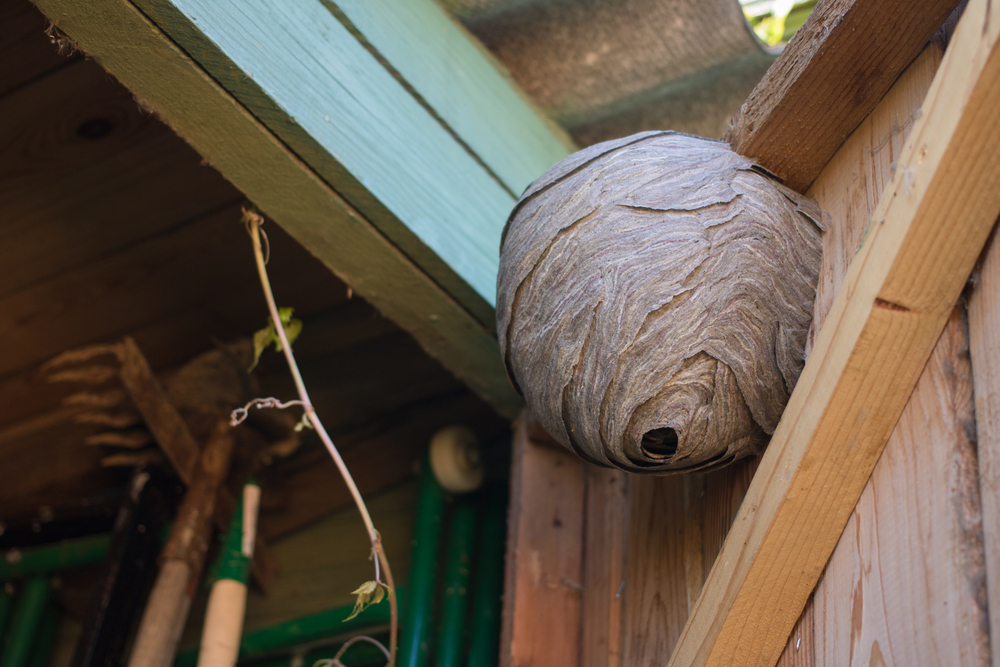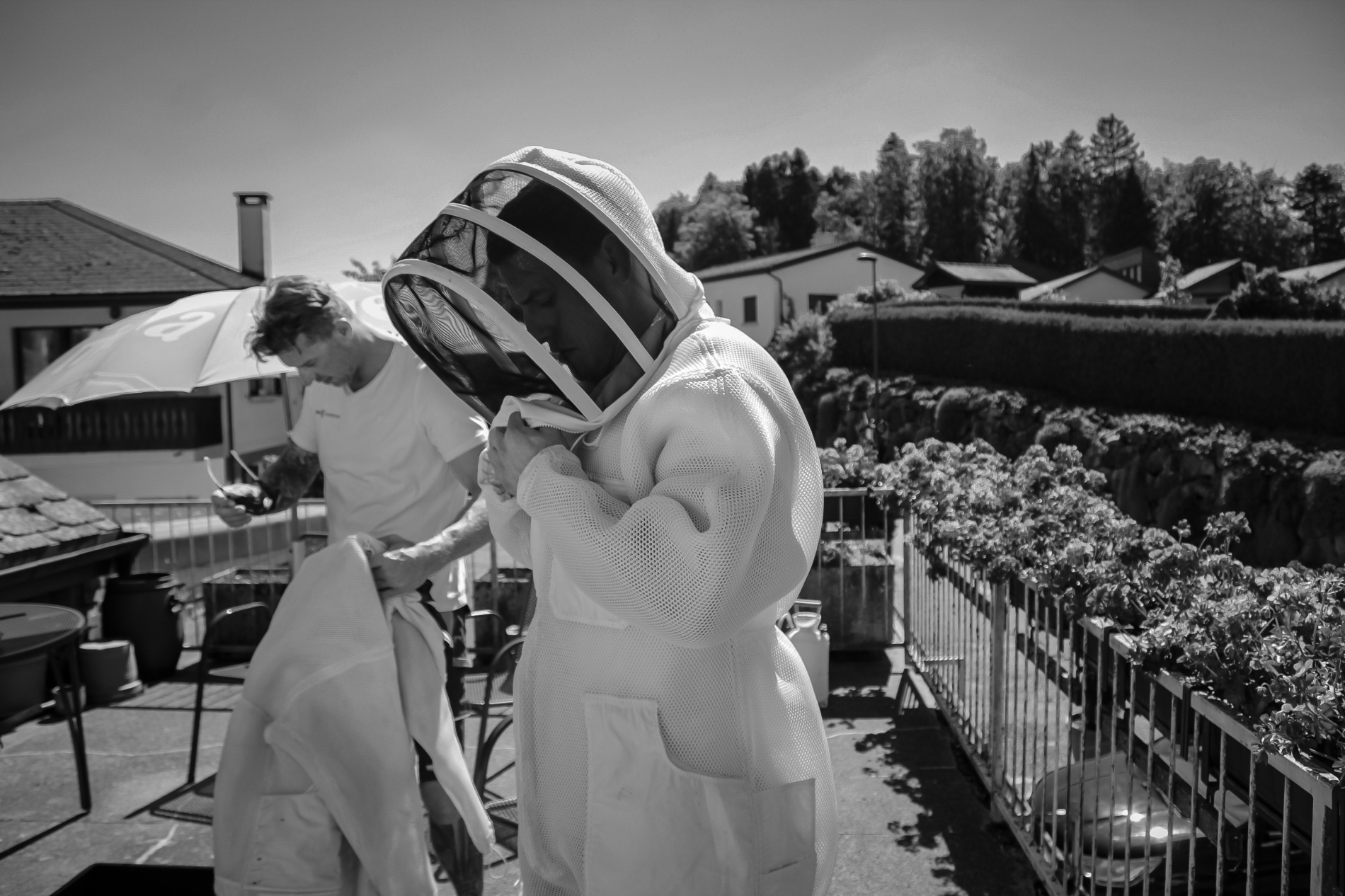
Remove the hornet's nest correctly
Contact us now: 058 510 22 54
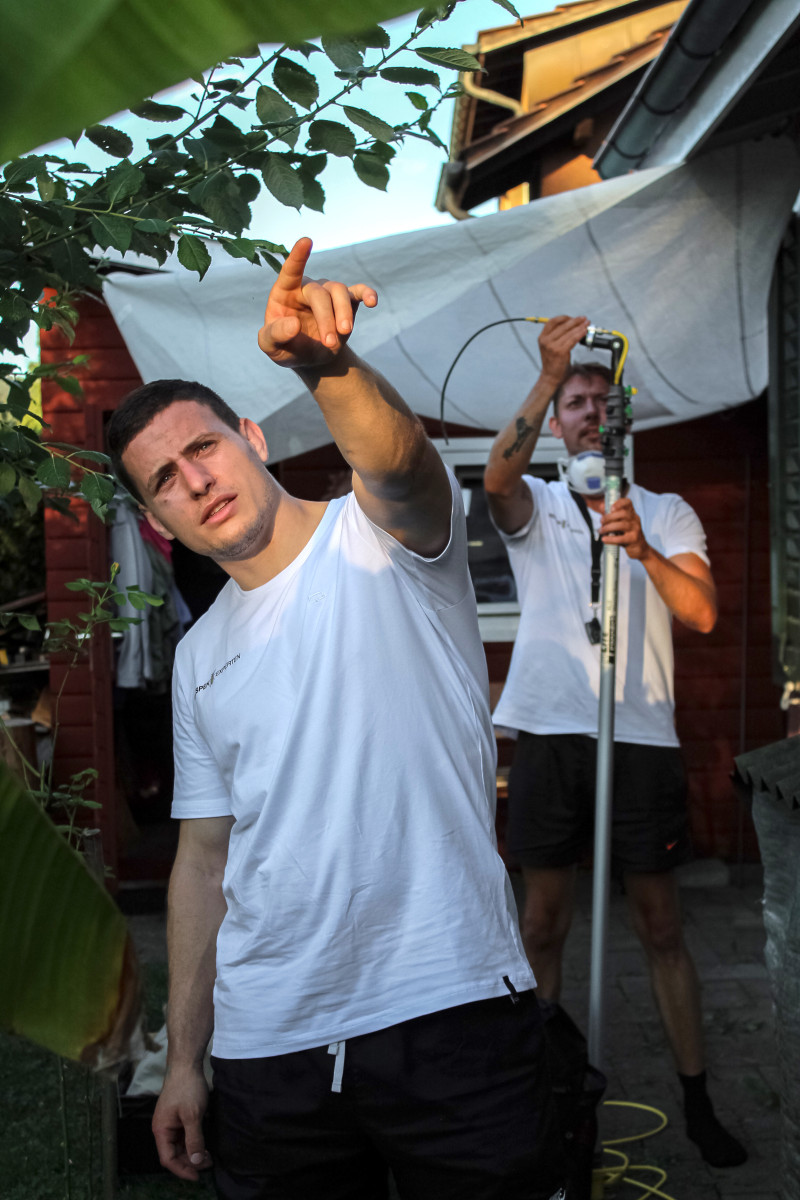
Remove hornet's nest in Switzerland
The European hornet, Better known as a hornet, it is one of the real wasps. They are not aggressive towards humans and are even useful in gardens and for nature as they eat other pests such as small insects and arachnids. They cannot be killed due to species protection Hornets buzz loudly, which makes them appear dangerous. But they are more peaceful than wasps and do not sit on food. Hornets only attack when they feel threatened by themselves or their surroundings. The animals follow their instinct and their most important task, the preservation of their species. If you don't act hectic but calm around them, they will simply fly past you. However, many people want to remove a hornet's,as soon as they discover it in their own area. Contact the experts for hornet nest removal in Switzerland!
Use the uncomplicated telephone service of the Hornet Experts und informieren and simply inform us at 058 510 22 54, we are the contact person for professional hornet nest removal in Switzerland, so that you and everyone around you feels completely safe again.
Differences between Hornets and Wasps
Hornet vs. wasp - distinguishing between the small buzzing animals is easy for most people. However, what about hornet nest and wasp nest detection? Distinguishing this is a bit more difficult. Our experts will explain to you what the difference is between hornets and wasps. To build their nests, both insects use remains of gnawed wood in combination with saliva, which together forms a paper-like mass. The two nests can be distinguished mainly by their size and color. Wasp nests are usually more grayish in color, while hornet nests are more brownish and are usually not as large as wasp nests due to the smaller nest population. To avoid being attacked by the flying inhabitants, it is better to hire a Prrofessional Pest Controller like the Hornets Experts. We can identify the nest without a doubt and take further steps to remove the hornets professionally. See our overview of the visual differences between hornets and wasps.
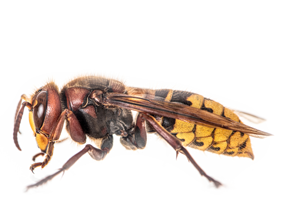
Hornet
| Coloration: | Head and torso reddish-brown, rear part yellow |
| Body Shape: | Elongated, broad, similar to a wasp |
| Size of the Queen: | 23 to 35 mm |
| Size of the Workers: | 18 to 25 mm |
| Stinger: | All females have a stinger |
| Size of the Colony: | 400 - 700 Animals |
| Diet: | Predator |
| Special Features: | Capture harmful insects in the garden |
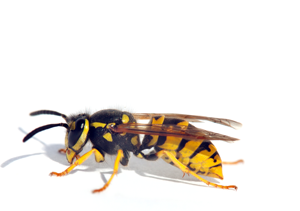
Wasp
| Coloration: | Yellow-black striped coloration over the entire body |
| Body Shape: | Smaller than a hornet and with a wasp waist |
| Size of the Queen: | Up to approximately 20 mm |
| Size of the Workers: | 11 to 14 mm |
| Stinger: | All females have a stinger |
| Size of the Colony: | 3000 - 4000 Animals |
| Diet: | Tree saps, nectar, pollen, animal food |
| Special Features: | Capture harmful insects in the garden |
Updates about the Hornet Experts
Recognizing a Hornet's Nest: Appearance, Location & Sounds
It can be difficult for laypeople to distinguish a hornet's nest from a wasp's nest. However, since there are very different legal species protection regulations and treatment methods for the different insect species, it is first of all important that you clearly identify a hornet's nest as such. Only if you recognize a hornet nest can you drive away the hornets and ensure that the removal is professional. Bees, hornets and wasps like to build their nests in well-protected and dark places, such as roof gables, blind boxes, gazebos, sheds and garages. In addition, hornet nests usually have an opening in the bottom through which feces and other nest waste are thrown out. Unfortunately, it is usually not possible to do this exclusively from the outside and, above all, at a great distance from the nest - which you should definitely keep! – to recognize which nest it is exactly. If you would like the hornet's nest to be removed immediately by the Hornet Experts, simply call us or simply arrange your desired appointment online.
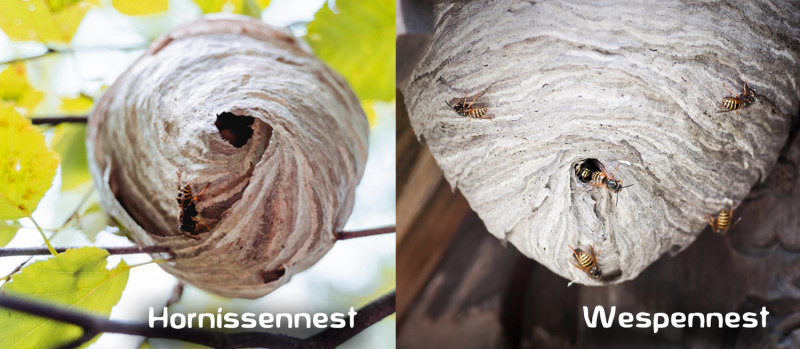
Hornet's Nest |
Wasp's Nest |
| Nest size smaller, due to a smaller population, maximum length 60 cm, plastered, light brown shell around a horizontally arranged comb plate, one hole as the bottom opening. Location: Rain-protected spots, mostly in and around the house, roof gables, sheds, and branch forks. Noises: Humming during day and night, as hornets are nocturnal. During the day, there's flight traffic from incoming and outgoing worker hornets at the nest. |
Nest size: roundish nests up to the size of a soccer ball, grayish color, and exceptional sizes are possible. Location: Rain-protected spots around the house, garden sheds, and occasionally in the ground. Noises: Humming and buzzing during the day, occasionally you can hear larva sounds. |
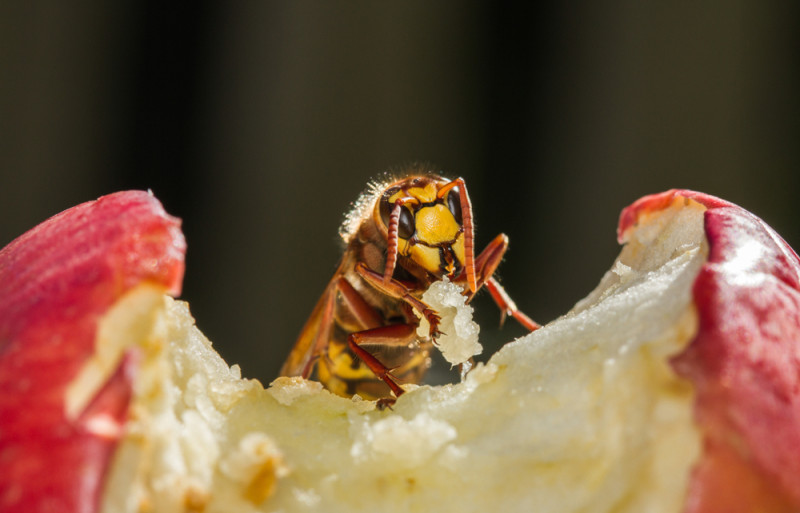
What to do against Hornets?
7 tips on how to deal with Hornets!
Because you can't always remove a hornet's nest right away, you should follow a few tips when dealing with hornets. Because it is often possible to live peacefully with the insects until a professional pest control expert like the hornets is on site to remove the hornet's nest.
- Maintain a safe distance of about 3 to 4 meters from the nest.
- Avoid frantic movements near the hornet.
- Do not touch the nest as long as there's a colony inside.
- Keep the flight path to the nest and the hornet's landing spot clear. Small children should not go near the nest.
- Use insect screens to prevent hornets from entering the house.
- Do not attempt to scare away or deter hornets.
- To lure hornets away, you can use home remedies against hornets, such as a lemon slice studded with cloves.
Fighting hornets: For a quick and professional removal of a hornet nest anywhere in Switzerland by the hornet experts, simply contact our hornet removal team and easily arrange an appointment at a time that suits you best.
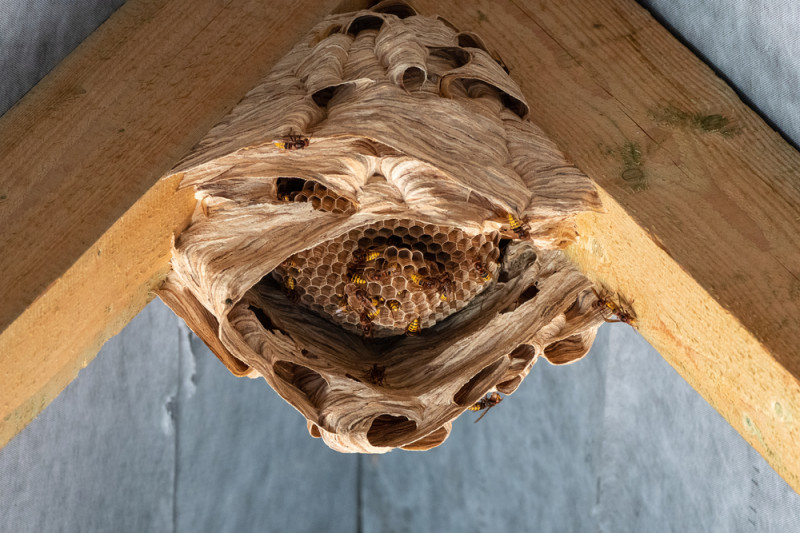
Remove hornet nest correctly
What to do if you find a nest?
Since hornets find less and less space to build nests in nature, they seek shelter on garden roofs, sheds or attics. If you discover a nest in an inconvenient place such as an entrance door or window or you are allergic and want to have it relocated or removed, you can follow these steps to remove the hornet's nest in Switzerland:
If you have discovered a hornet nest, it is always advisable to first contact a specialist hornet removal company. Contact us directly and arrange your cleaning appointment when it suits you best.
Further information on protected species in Switzerland can be found here: BAFU
Prevent hornets from building nests
There are some measures you can take to prevent hornets from building nests. It is important to know where hornets build their nests. Maybe you have already discovered a hornet's nest, or you simply want to know when hornets build their nest. We have put together some answers to these questions for you.
- Hornets usually build their nests near residential buildings, such as in gardens, on roofs or in basements. It is therefore important to regularly look for hornet nests and have them removed early
- Blocking entry points prevents hornets from re-entering. You can use wire mesh or hornet adhesive paper, for example. However, this should only be done in the winter months when the nest is definitely not inhabited
- To keep hornets away, you can use special scents or pheromones. Placing hornet traps near the house can also help
- It is important to make regular repairs to close entry points for hornets. This can be, for example, cracks, gaps or holes in the facade of the house
Have a hornet's nest relocated - 5 reasons
If you have discovered a hornet's nest, the shock will be deep. - However, before you panic and want to get rid of the hornets, there is first of all some good news: Hornets are far more peace-loving than many people think and are usually not interested in human treats such as cake, lemonade, etc. interested. So that the hornets don't continue to buzz around you, your children and your pets, it is advisable to have a hornet nest relocated. We have summarized some good reasons for you.
- Allergies: If you or someone in your family has allergies
- Location of the nest: If the nest is in the immediate vicinity of residential buildings or at the entrance to the house
- Safety: Hornets can sometimes be aggressive animals when they feel threatened
- Professional concerns: People who work outdoors (e.g. gardeners, farmers, forestry workers)
- Aesthetics: A hornet's nest can also be perceived as unsightly if it is in a conspicuous place
OUR HORNET PROFESSIONALS ARE CERTIFIED BY THE FEDERAL PROFESSIONAL CERTIFICATE.
Contact us easily by phone.
058 510 22 54
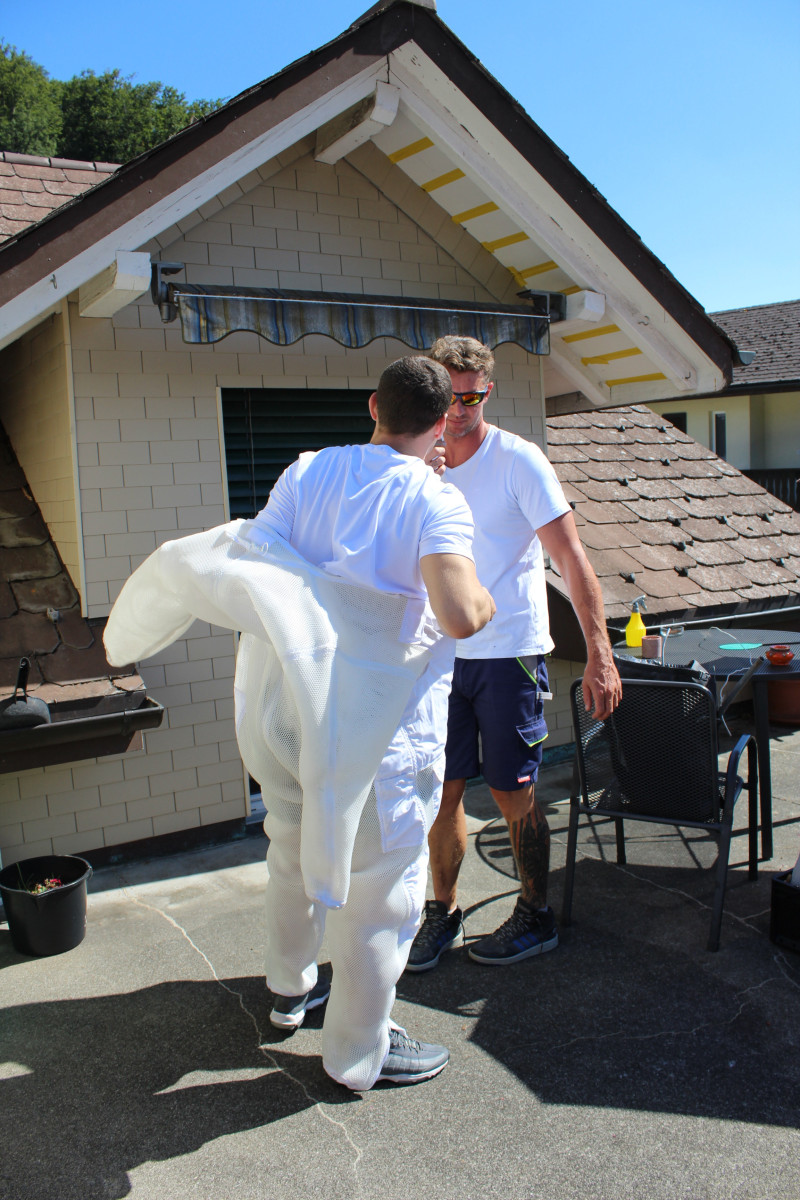
Remove hornets in Switzerland
Fast, safe & efficient!
If hornets have settled in your home, this can not only be unpleasant, but may also be dangerous and you will have to remove the hornet's nest.
Under no circumstances should you try to remove or relocate the hornet's nest yourself, as the hornets become highly aggressive and can attack you, but it is best to call in a professional pest control such as our hornet experts.
Our qualified employees offer you a safe, cost-effective and, above all, fast hornet control service. Simply contact us free of charge using our contact form or by phone at 058 510 22 54 - we will make a non-binding and quick offer for you!
Frequently asked questions about hornets
Hornets are protected because they play an important role in the ecology and their population has declined in some regions. Hornets are important pollinators for many plant species and they also help control insect pests by eating other insects.
A hornet's nest is usually round or oval in shape and is made of paper that the hornets make from wood fibers and their saliva. It can come in different sizes and shapes depending on the type of hornet.
The price for hornet nest removal varies depending on the size and location of the nest, as well as the type of hornet and the company doing the removal. There are no fixed prices and it depends on many factors.
Hornets have long, slender bodies and are usually black and yellow in color. They have a relatively large head with mandible-like jaws and large eyes. They have two pairs of wings, the back pair of which is larger than the front pair.
Removing a hornet's nest should always be done by a professional pest controller as it can be very dangerous and doing it wrong can result in serious injury.
Hornets are generally not dangerous as long as they are not threatened or provoked. They are usually peaceful and only attack when they feel threatened or need to defend their nest. However, a hornet sting can be dangerous for some people, especially those with allergic reactions.
To prevent hornet nests, you can take hornet deterrent measures such as hanging scents or setting hornet traps. It is important to seek professional help from a pest controller if you want to remove the nest, as hornets can become dangerous if they feel threatened.
Hornets live in most regions of the world, including Europe, North America, Asia and Africa. They prefer mild, temperate climates and can be found in forests, parks and gardens. Hornets build their nests in trees, bushes, buildings, and even man-made structures such as attics and walls.
The size of hornets varies depending on the species. The largest species of hornets can reach up to 4 cm in length, while the smallest species are only 1.5 cm long. The body shape also varies, some hornet species have an elongated, cylindrical shape, while others have a wider, spherical shape.
In Europe, the wasps of the genus Vespa are the largest, measuring up to 3.5 cm.
The hornet queen has the most important role in the nest as she is the only reproductive female hornet and lays the eggs that hatch into the workers, drones and future queens. She is responsible for the continued existence of the colony and lays several hundred eggs in the first few weeks of nest building.
Would you like more information about hornets? Then take a look at our FAQs about hornets.
Private inquiry form
For an uncomplicated inquiry about removing a hornet's nest, use our contact form for private individuals.
Real estate inquiry form
Use our property management order form to request the removal of a hornet's nest.
Remove hornets - Bioschutz GmbH
Active throughout Switzerland
Head office 4143 Dornach



